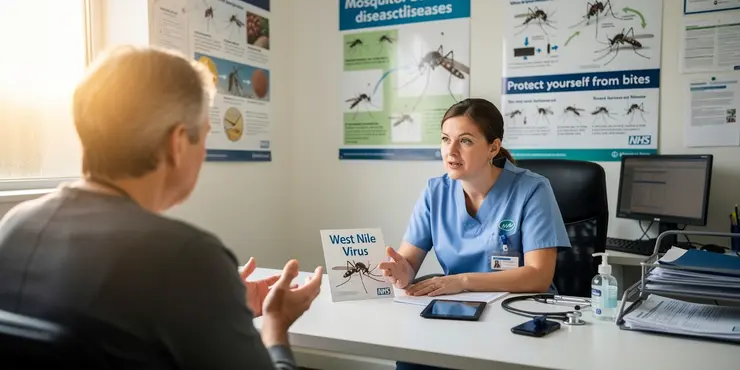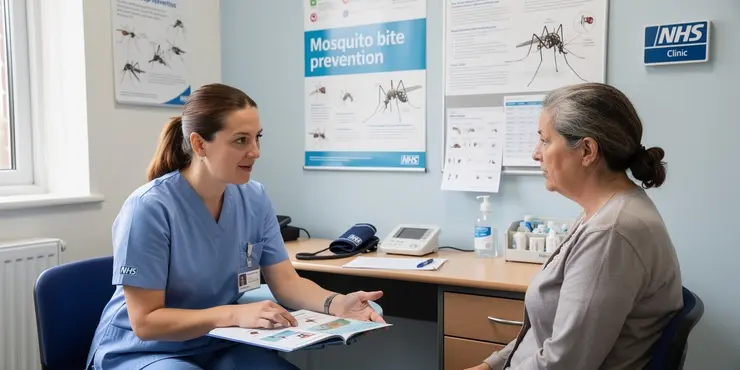
Find Help
More Items From Ergsy search
-

Is there a cure for Nipah Virus?
Relevance: 100%
-

What is Nipah Virus?
Relevance: 99%
-

How is Nipah Virus diagnosed?
Relevance: 96%
-

How is Nipah Virus transmitted?
Relevance: 95%
-

Where was Nipah Virus first identified?
Relevance: 94%
-

Can Nipah Virus cause outbreaks?
Relevance: 93%
-

What are the symptoms of Nipah Virus infection?
Relevance: 91%
-

Can Nipah Virus cause neurological complications?
Relevance: 90%
-

Which animals are known to carry Nipah Virus?
Relevance: 90%
-

What is the mortality rate of Nipah Virus infection?
Relevance: 88%
-

What global organizations are involved in Nipah Virus research?
Relevance: 87%
-

Has a vaccine been developed against Nipah Virus?
Relevance: 87%
-

How is Nipah Virus controlled during outbreaks?
Relevance: 87%
-

Can Nipah Virus be transmitted from person to person?
Relevance: 86%
-

What should someone do if they suspect Nipah Virus infection?
Relevance: 85%
-

What regions are most at risk for Nipah Virus outbreaks?
Relevance: 85%
-

What role do fruit bats play in Nipah Virus transmission?
Relevance: 85%
-

Why are Nipah Virus outbreaks considered a public health concern?
Relevance: 83%
-

What preventive measures can reduce the risk of Nipah Virus infection?
Relevance: 82%
-

What is Nipah Virus?
Relevance: 49%
-

Is the Marburg virus related to the Ebola virus?
Relevance: 42%
-

What is the Marburg Virus?
Relevance: 38%
-

Is there a vaccine for Marburg virus?
Relevance: 38%
-

Is there a vaccine for the Zika virus?
Relevance: 37%
-

What is the Ebola virus?
Relevance: 37%
-

Is Zika virus present in the UK?
Relevance: 37%
-

What is West Nile Virus?
Relevance: 37%
-

How is the Zika virus transmitted?
Relevance: 37%
-

How is the Marburg virus transmitted?
Relevance: 37%
-

Does the UK have Zika virus?
Relevance: 36%
-

What is West Nile Virus?
Relevance: 36%
-

Is there a vaccine for West Nile Virus?
Relevance: 36%
-

Is there a test for West Nile Virus?
Relevance: 36%
-

How is Chikungunya virus transmitted?
Relevance: 36%
-

What are the symptoms of Zika virus?
Relevance: 36%
-

Are there treatments for West Nile Virus?
Relevance: 36%
-

Where was the Marburg virus first discovered?
Relevance: 35%
-

What research is being done on the Marburg virus?
Relevance: 35%
-

How is West Nile Virus transmitted?
Relevance: 35%
-

Can Zika virus affect pregnancy?
Relevance: 35%
What is Nipah Virus?
The Nipah virus (NiV) is a zoonotic virus, meaning it spreads between animals and humans. It was first identified in Malaysia in 1999 following an outbreak among pigs and pig farmers. Despite being relatively rare, it poses significant health concerns due to its potential to cause severe respiratory and neurological diseases in humans.
Origin and Transmission
Nipah virus naturally resides in fruit bats, specifically those belonging to the Pteropus genus, which are its primary reservoir. Transmission to humans can occur directly or indirectly. People can become infected through direct contact with the bodily fluids of infected bats or pigs. Additionally, consumption of fruits or fruit products, such as contaminated raw date palm sap that have been tainted by infected bats, can also lead to the virus transmission.
Symptoms
The infection presents a range of symptoms. In the early stages, individuals may experience fever, headache, and muscle pain, resembling common viral infections. However, the condition can rapidly progress to severe respiratory distress and acute encephalitis, which is inflammation of the brain. Encephalitis can lead to confusion, drowsiness, and severe neurological complications, including seizures and coma. The incubation period for Nipah virus usually ranges between 4 to 14 days, but periods as long as 45 days have been reported.
Risk and Prevalence
While outbreaks primarily occur in South and Southeast Asia, especially in Bangladesh and India, the potential for the virus to spread to other regions exists. Factors such as global travel and trade could facilitate its wider dissemination. Human-to-human transmission has been documented in some cases, particularly in healthcare settings or through close contact with infected individuals, further underlining the potential risks associated with this virus.
Prevention and Treatment
Currently, there is no specific treatment or vaccine available for Nipah virus infection. Management of the virus is primarily supportive, focusing on alleviating symptoms and maintaining proper hydration and body functions. Preventive measures play a crucial role in controlling the spread of the virus. These include avoiding contact with bats and sick animals, practicing good hygiene, and avoiding consumption of contaminated raw fruits and fruit products.
Impact on Public Health
The Nipah virus poses a significant threat due to its high mortality rate and potential for causing widespread outbreaks. Public health efforts are focused on surveillance, early detection, and response strategies to manage and contain new outbreaks. Research and development of vaccines and therapeutics are ongoing amidst concerns about the virus's potential use in bioterrorism due to its lethality.
Conclusion
Understanding the nature and risks of Nipah virus is crucial for effective prevention and control. Public awareness and global cooperation are vital in addressing the challenges posed by this infectious disease and ensuring preparedness for any potential outbreaks.
What is Nipah Virus?
Nipah virus is a type of germ that can spread from animals to people. It was first found in Malaysia in 1999. It started with pigs and the people who took care of them. Even though it's not common, it can make people very sick, especially with breathing and brain problems.
Where Does It Come From and How Does It Spread?
Nipah virus lives in fruit bats. These bats carry the virus without getting sick. People can catch the virus by touching bats or pigs that are sick. It can also spread if people eat fruit or drink juice (like date palm sap) that bats have touched and contaminated.
What Are the Symptoms?
People who get the virus might feel like they have the flu at first. They might have a fever, headache, and body aches. It can get worse very fast, making it hard to breathe and causing brain swelling. This can make people feel confused or sleepy, and they might even have seizures or go into a coma. Usually, symptoms show up within 4 to 14 days after catching the virus, but sometimes it can take up to 45 days.
How Common Is It and Where?
Most of the time, Nipah virus is found in South and Southeast Asia, like in Bangladesh and India. But because people travel a lot, the virus could spread to other places. Sometimes, the virus can pass from one person to another, especially in hospitals or if someone is very close to a sick person.
How Can We Prevent and Treat It?
There is no medicine or vaccine for Nipah virus right now. Doctors can only help people feel better by treating the symptoms. It's important to stop the virus from spreading. People should stay away from bats and sick animals, wash their hands often, and not eat or drink things that might be contaminated by bats.
Why Is It a Concern for Public Health?
Nipah virus is dangerous because it can kill many people and cause big outbreaks. Health experts work hard to watch for new cases and react quickly to control them. Scientists are trying to make vaccines and treatments. There are also worries about the virus being used as a weapon because it's so deadly.
Conclusion
Learning about Nipah virus is important to keep people safe. Everyone needs to know how to stop it from spreading and what to do if there is an outbreak. Working together worldwide is key to handling this serious disease.
Frequently Asked Questions
What is Nipah Virus?
Nipah Virus is a zoonotic virus that can be transmitted from animals to humans and can also be spread through contaminated food or directly between people.
What are the symptoms of Nipah Virus infection?
Symptoms include fever, headache, drowsiness, respiratory issues, and confusion which could progress to coma within 24-48 hours.
How is Nipah Virus transmitted?
Nipah Virus can be transmitted through close contact with infected animals like bats and pigs, eating contaminated food, or contact with an infected person's bodily fluids.
Is there a cure for Nipah Virus?
There is currently no specific cure for Nipah Virus. Treatment focuses on managing symptoms and providing supportive care.
Where was Nipah Virus first identified?
Nipah Virus was first identified in 1998 during an outbreak in Malaysia.
Which animals are known to carry Nipah Virus?
Fruit bats, particularly those belonging to the Pteropus genus, are the natural hosts of Nipah Virus.
Can Nipah Virus cause outbreaks?
Yes, Nipah Virus can cause outbreaks, and has resulted in multiple outbreaks since its discovery, especially in South and Southeast Asia.
How is Nipah Virus diagnosed?
Nipah Virus is diagnosed through laboratory tests such as PCR from throat swabs, urine, or cerebrospinal fluid specimens, and serological tests.
What preventive measures can reduce the risk of Nipah Virus infection?
Preventive measures include avoiding contact with sick animals, consuming properly washed food, and practicing good personal hygiene.
Has a vaccine been developed against Nipah Virus?
As of now, there is no commercial vaccine available for Nipah Virus, though research and development are ongoing.
What is the mortality rate of Nipah Virus infection?
The mortality rate for Nipah Virus infection can be between 40% to 75%, depending on the outbreak and local capabilities for clinical management.
Can Nipah Virus be transmitted from person to person?
Yes, person-to-person transmission has been reported, notably among family members and caregivers of infected individuals.
What regions are most at risk for Nipah Virus outbreaks?
Regions in South and Southeast Asia, particularly those with bat populations and close animal-human interactions, are most at risk.
How is Nipah Virus controlled during outbreaks?
Control measures include surveillance, quarantine, public health campaigns, and sometimes culling of infected animals.
What global organizations are involved in Nipah Virus research?
Organizations like the World Health Organization (WHO) and the Centers for Disease Control and Prevention (CDC) are actively involved in Nipah Virus research.
How long is the incubation period for Nipah Virus?
The incubation period for Nipah Virus ranges from 4 to 14 days, but can be as long as 45 days in some cases.
Can Nipah Virus cause neurological complications?
Yes, Nipah Virus can result in severe neurological complications, including encephalitis and convulsions.
What role do fruit bats play in Nipah Virus transmission?
Fruit bats are natural reservoirs of Nipah Virus and can transmit it to other animals and humans through their saliva, urine, or feces.
What should someone do if they suspect Nipah Virus infection?
Seek immediate medical care, isolate from others to prevent spread, and follow public health authorities' guidelines.
Why are Nipah Virus outbreaks considered a public health concern?
Nipah Virus outbreaks are of concern due to their high mortality rate, potential for rapid spread, and lack of specific treatments or vaccines.
What is Nipah Virus?
Nipah Virus is a type of germ that can make people and animals sick. It can spread from animals to people. Some people who get it may feel very bad or have a fever.
To stay safe, wash your hands often and stay away from sick animals.
If you find reading hard, you can ask someone to read this to you or use a talking dictionary.
The Nipah Virus is a germ that makes people sick. It can spread from animals to people. It can also spread through bad food or from one person to another.
What happens if you catch Nipah Virus?
Nipah Virus can make you very sick. Here are some things you might feel:
- Feel hot: This is called a fever.
- Have a headache: Your head might hurt a lot.
- Feel dizzy or confused: Things might not make sense.
- Feel weak or tired: It can be hard to do things.
- Have a cough: You might cough a lot.
If you feel these things, tell an adult or see a doctor. They can help you feel better.
Here are some tips if reading is hard:
- Ask someone to read with you.
- Use a ruler or your finger to keep your place.
- Take your time and read slowly.
People may feel hot or have a fever. They might get a headache, feel very sleepy, have trouble breathing, or feel mixed up and confused. These feelings can get worse and lead to a deep sleep, called a coma, in one or two days.
How does the Nipah Virus spread?
The Nipah Virus can spread in a few ways:
- From bats to people. Bats can drop saliva or pee on fruits. If we eat those fruits, we can get sick.
- From pigs to people. If a pig has the virus and we touch it, we can get sick.
- From person to person. If a sick person coughs on us, we can catch the virus.
Here are some tips to stay safe:
- Wash hands often with soap and water.
- Don't eat fruits with bite marks.
- Stay away from sick people.
You can catch Nipah Virus in a few ways. You might get it if you are near sick animals like bats or pigs. You could also get it by eating food that's not clean or if you touch someone sick with their body fluids.
Can Nipah Virus Be Cured?
No, we do not have medicine to cure Nipah Virus yet. But doctors can take care of people to help them feel better.
Use simple words if you're helping someone understand. Reading tools like audiobooks can help too.
There is no special medicine to make Nipah Virus go away. Doctors help by making you feel better and taking care of you while you are sick.
Where was the Nipah Virus found first?
The Nipah Virus was first found in Malaysia. This happened in 1998.
If you find this hard to read, you can:
- Ask someone to read it to you.
- Use a computer program to read it out loud.
- Break the words into smaller parts.
Nipah Virus was first found in 1998. It happened during a sickness outbreak in Malaysia.
What animals have Nipah Virus?
Some animals can have Nipah Virus. Here are the ones we know:
- Bats: Fruit bats are the main animals that can have this virus. They can carry it without getting sick.
- Pigs: Pigs can also get the virus from bats and sometimes they spread it to people.
If you want help to read or understand more, you can:
- Use a dictionary to look up hard words.
- Ask someone to read with you.
- Use audiobooks if you like listening more than reading.
Fruit bats are a type of bat. Some of these bats have a name: Pteropus. They carry Nipah Virus.
Can Nipah Virus make lots of people sick at the same time?
Yes, Nipah Virus can make people sick, and it can spread to many people at once. This is called an outbreak. It is important to stay safe and listen to what doctors say.
To help stay safe, you can:
- Wash your hands often with soap and water.
- Stay away from sick people.
- Listen to news or ask a grown-up for advice.
Yes, Nipah Virus can cause outbreaks. This means it can make many people sick at the same time. Nipah Virus has made people sick more than once since it was first found. It has mostly happened in South and Southeast Asia.
For reading help, you can use:
- Audio Books: Listen to the text being read out loud.
- Text-to-Speech Tools: Use apps that read text for you.
- Highlighting Tools: Use tools that highlight each word as you read.
How do doctors find out if someone has Nipah Virus?
Doctors can find out if someone has the Nipah Virus by doing special tests. They might check a person's throat, pee, or the fluid from around their brain. These tests have names like PCR and serological tests.
How can you stay safe from the Nipah Virus?
Here are ways to protect yourself:
- Wash your hands with soap to keep them clean.
- Avoid being near sick people.
- Stay away from bats and their homes.
- Do not eat fruits that have been bitten by animals.
- Boil or peel fruits before eating them.
- Wear gloves if you care for someone who is sick.
Using pictures or videos can help you understand better.
To stay healthy, do these things:
- Stay away from sick animals.
- Wash your food properly before eating.
- Keep yourself clean by washing your hands often.
These can help keep germs away. It's a good idea to use tools like picture charts to remember these steps.
Is there a vaccine for Nipah Virus?
The Nipah Virus is a sickness that can make people very ill.
Right now, there is no vaccine to stop Nipah Virus. This means doctors and nurses have to use other ways to help people stay safe.
To learn more, you can ask a doctor or look for videos that explain it simply.
Right now, there is no shot (vaccine) to stop Nipah Virus that you can buy in stores or get from the doctor. But scientists are working hard to make one.
How many people die from Nipah Virus?
The Nipah Virus can make people very sick. Some people who get this virus do not get better.
Many people who get the Nipah Virus die from it. This is called the "death rate."
If you want to know more, you can ask a doctor or nurse.
The number of people who die from Nipah Virus can be as low as 40 out of 100 and as high as 75 out of 100. This can change depending on where the outbreak happens and how good the local hospitals are at treating it.
Can Nipah Virus spread from one person to another?
Yes, people can give Nipah Virus to each other. This means if someone is sick with Nipah Virus, they can make other people sick too.
To stay safe, wash your hands often, wear a mask, and avoid close contact with sick people. Talking to a doctor and getting good advice can also help keep you safe.
Yes, people can spread it to each other. This happens a lot with family and people who take care of someone who is sick.
Where is Nipah Virus most likely to spread?
Nipah Virus can spread in some places more than others. It is important to know where it is most likely to happen.
If you are worried about Nipah Virus, try using maps and pictures to see where it might spread. You can also ask someone for help or use a computer to look up more information.
Places in South and Southeast Asia have many bats. People and animals are often close together here. This makes these areas more likely to have problems.
How do we stop Nipah Virus from spreading?
To stop the spread of illness, people can use different ways. These ways include:
- Watching out for sick people or animals.
- Keeping sick people or animals away from others.
- Teaching everyone how to stay healthy.
- Sometimes, if an animal is sick, it might be necessary to get rid of the animal to stop the illness.
Which groups around the world study the Nipah Virus?
There are some big groups that look at the Nipah Virus. These groups want to learn more about it and how to stop it.
Here are some tools that might help you understand:
- Use pictures to help explain ideas.
- Watch videos that show what the virus is and how people study it.
- Ask someone you trust to explain things to you.
Big groups like the World Health Organization (WHO) and the Centers for Disease Control and Prevention (CDC) are studying the Nipah Virus to learn more about it.
How Long Does It Take to Get Sick from Nipah Virus?
The time it takes for someone to start feeling sick after catching the Nipah Virus is usually 4 to 14 days. But sometimes, it can take up to 45 days.
Can Nipah Virus affect the brain?
Yes, Nipah Virus can cause serious brain problems. This includes brain swelling and seizures.
How do fruit bats spread the Nipah Virus?
Fruit bats can carry the Nipah Virus. They sometimes drop fruit that has the virus. Other animals or people might eat this fruit and get sick. It's important to be careful and not eat fruit that has been bitten by bats.
Using pictures can help you understand this better. You can also use a ruler or your finger to follow along as you read.
Fruit bats carry a virus called Nipah. They can spread it to other animals and people. This can happen through their spit, pee, or poo.
Here are some tips to make reading easier:
- Use a ruler or your finger to follow each line of text.
- Take breaks if you get tired.
- Ask someone for help if you don’t understand a word.
What to Do if You Think You Have Nipah Virus?
Do you feel sick and think you might have Nipah Virus? Here are some simple steps:
- Tell a grown-up: If you feel unwell, tell a parent, teacher, or another adult you trust.
- See a doctor: Go to the doctor or a hospital to get checked.
- Wash your hands: Keep your hands clean by washing them often with soap and water.
- Keep away from others: Stay at home and away from other people so you don’t spread germs.
- Rest: Make sure to get lots of rest.
If you find reading hard, ask an adult to help you. Remember, it’s always a good idea to check with a doctor.
See a doctor right away. Stay away from other people so you don't make anyone sick. Listen to the rules from health experts.
Why is the Nipah Virus important for everyone's health?
The Nipah Virus is important because it can make people very sick. It can spread from person to person, making more people sick. It comes from animals like bats and pigs. If a lot of people get sick, doctors and nurses have to work very hard to help them. This can be scary for friends and families.
To stay safe, people can learn how the virus spreads. Washing hands often and staying away from sick people helps. It is also good to listen to doctors and health experts. They can give important advice to keep people healthy.
Using pictures or videos can help people understand better. Drawing or telling simple stories can make it easier to learn about the virus. Remember to ask questions if something is not clear. It's okay to ask for help from teachers or parents.
Nipah Virus is a big worry. It can make many people very sick and even cause death. It spreads quickly from one person to another. Right now, there is no special medicine or vaccine to stop it.
If you want to understand more, you can ask someone to explain or use a simple video or picture to help you learn.
Useful Links
This website offers general information and is not a substitute for professional advice.
Always seek guidance from qualified professionals.
If you have any medical concerns or need urgent help, contact a healthcare professional or emergency services immediately.
Some of this content was generated with AI assistance. We’ve done our best to keep it accurate, helpful, and human-friendly.
- Ergsy carfully checks the information in the videos we provide here.
- Videos shown by Youtube after a video has completed, have NOT been reviewed by ERGSY.
- To view, click the arrow in centre of video.
- Most of the videos you find here will have subtitles and/or closed captions available.
- You may need to turn these on, and choose your preferred language.
- Go to the video you'd like to watch.
- If closed captions (CC) are available, settings will be visible on the bottom right of the video player.
- To turn on Captions, click settings .
- To turn off Captions, click settings again.
More Items From Ergsy search
-

Is there a cure for Nipah Virus?
Relevance: 100%
-

What is Nipah Virus?
Relevance: 99%
-

How is Nipah Virus diagnosed?
Relevance: 96%
-

How is Nipah Virus transmitted?
Relevance: 95%
-

Where was Nipah Virus first identified?
Relevance: 94%
-

Can Nipah Virus cause outbreaks?
Relevance: 93%
-

What are the symptoms of Nipah Virus infection?
Relevance: 91%
-

Can Nipah Virus cause neurological complications?
Relevance: 90%
-

Which animals are known to carry Nipah Virus?
Relevance: 90%
-

What is the mortality rate of Nipah Virus infection?
Relevance: 88%
-

What global organizations are involved in Nipah Virus research?
Relevance: 87%
-

Has a vaccine been developed against Nipah Virus?
Relevance: 87%
-

How is Nipah Virus controlled during outbreaks?
Relevance: 87%
-

Can Nipah Virus be transmitted from person to person?
Relevance: 86%
-

What should someone do if they suspect Nipah Virus infection?
Relevance: 85%
-

What regions are most at risk for Nipah Virus outbreaks?
Relevance: 85%
-

What role do fruit bats play in Nipah Virus transmission?
Relevance: 85%
-

Why are Nipah Virus outbreaks considered a public health concern?
Relevance: 83%
-

What preventive measures can reduce the risk of Nipah Virus infection?
Relevance: 82%
-

What is Nipah Virus?
Relevance: 49%
-

Is the Marburg virus related to the Ebola virus?
Relevance: 42%
-

What is the Marburg Virus?
Relevance: 38%
-

Is there a vaccine for Marburg virus?
Relevance: 38%
-

Is there a vaccine for the Zika virus?
Relevance: 37%
-

What is the Ebola virus?
Relevance: 37%
-

Is Zika virus present in the UK?
Relevance: 37%
-

What is West Nile Virus?
Relevance: 37%
-

How is the Zika virus transmitted?
Relevance: 37%
-

How is the Marburg virus transmitted?
Relevance: 37%
-

Does the UK have Zika virus?
Relevance: 36%
-

What is West Nile Virus?
Relevance: 36%
-

Is there a vaccine for West Nile Virus?
Relevance: 36%
-

Is there a test for West Nile Virus?
Relevance: 36%
-

How is Chikungunya virus transmitted?
Relevance: 36%
-

What are the symptoms of Zika virus?
Relevance: 36%
-

Are there treatments for West Nile Virus?
Relevance: 36%
-

Where was the Marburg virus first discovered?
Relevance: 35%
-

What research is being done on the Marburg virus?
Relevance: 35%
-

How is West Nile Virus transmitted?
Relevance: 35%
-

Can Zika virus affect pregnancy?
Relevance: 35%


